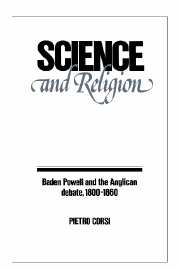Book contents
- Frontmatter
- Contents
- Preface
- List of abbreviations
- PART I
- Biographical introduction
- 1 The Hackney Phalanx: a family network
- 2 Baden Powell's early theological papers
- 3 Baden Powell's reflections on science in the early 1820s
- 4 Science and religion in the 1820s
- 5 Rational Religion Examined
- 6 Baden Powell between Oriel and Hackney
- PART II
- PART III
- PART IV
- Bibliography
- Index
1 - The Hackney Phalanx: a family network
Published online by Cambridge University Press: 15 December 2009
- Frontmatter
- Contents
- Preface
- List of abbreviations
- PART I
- Biographical introduction
- 1 The Hackney Phalanx: a family network
- 2 Baden Powell's early theological papers
- 3 Baden Powell's reflections on science in the early 1820s
- 4 Science and religion in the 1820s
- 5 Rational Religion Examined
- 6 Baden Powell between Oriel and Hackney
- PART II
- PART III
- PART IV
- Bibliography
- Index
Summary
Baden Powell was born at Stamford Hill, Hackney, on 22 August 1796. To state the place and the date of his birth is not, in this case, an instance of biographical pedantry. Indeed, Hackney, in those days a village north-east of London, and the rôle several families living there played in the social and cultural life of early nineteenth-century England, are of particular relevance to an understanding of Baden Powell's early intellectual career. It is the more interesting to pursue and describe our author's family connections, as we become aware of the fact that both Baden Powell himself and historians who have been concerned with his work, or with the activities of members of his family, have systematically failed to make clear the links between the much discussed figure of the Savilian Professor of Geometry at Oxford and the Hackney Phalanx, the famous High Church group of staunch supporters of the Constitution in Church and State during the early nineteenth century. Baden Powell, who was otherwise in the habit of indulging in copious references to his earlier works and ideas, persistently avoided mentioning his earliest contributions to the activities of the Hackney Phalanx. Mrs Baden Powell, who in 1866 published a sketch of her husband's life, omitted to list in the otherwise satisfactory bibliography of Baden Powell's works all the books and papers discussing theological and philosophical doctrines which he published before 1830.
In an impressive thesis on natural theology in the early decades of the nineteenth century, J. D. Yule analysed Baden Powell's early ideas on the relationship between science and religion.
- Type
- Chapter
- Information
- Science and ReligionBaden Powell and the Anglican Debate, 1800–1860, pp. 9 - 20Publisher: Cambridge University PressPrint publication year: 1988



